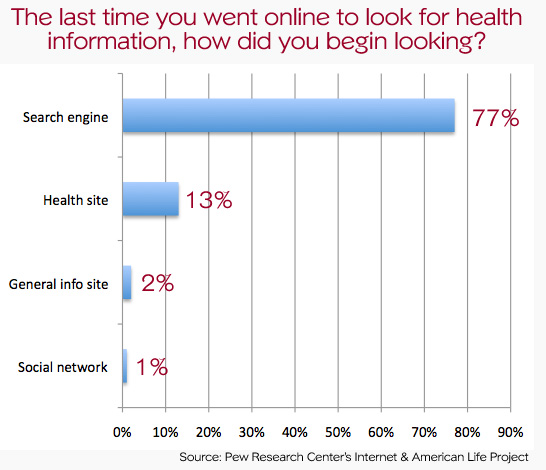77 Percent Of Online Health Seekers Start At Search Engines [Pew Study]
Although there’s long been a debate over the accuracy of health information online, many U.S. Internet users aren’t hesitant to use the Web when they want answers to health-related questions. And rather than dedicated health sites, the vast majority of them begin their research at a search engine. A new study out tonight from the […]
 Although there’s long been a debate over the accuracy of health information online, many U.S. Internet users aren’t hesitant to use the Web when they want answers to health-related questions. And rather than dedicated health sites, the vast majority of them begin their research at a search engine.
Although there’s long been a debate over the accuracy of health information online, many U.S. Internet users aren’t hesitant to use the Web when they want answers to health-related questions. And rather than dedicated health sites, the vast majority of them begin their research at a search engine.
A new study out tonight from the Pew Research Center’s Internet & American Life Project says that 72 percent of U.S. Internet users have gone online in the past year specifically for health-related information, and 77 percent of that group says their research started at Google, Bing or another general search engine.
That’s significantly more than the 13 percent that begin at health portals like WebMD, general information sites like Wikipedia (only two percent) and social networks (one percent).

(The remaining votes, not shown, were respondents who indicated “Other,” “Don’t Know” or who refused to answer.)
Those numbers skew a little higher among younger health seekers. Pew says that 82 percent of respondents 18-29 years old start at a search engine, compared to 73 percent of those 50 and older.
What about mobile?
Pew says that, overall, 31 percent of cell phone owners say they’ve used their phone to look for health information online. As you’d expect, that number jumps to 52 percent when specifically considering smart phone owners.
The debate over health information and the Web has been going on for years, with many doctors urging patients to not rely so much on Google for health research, and lamenting the fact that they often have to correct misinformation that patients find online, or correct incorrect conclusions that patients draw after doing health research online.
In 2008, a Microsoft study investigated “cyberchondria” — a term used to describe how sometimes online health research makes people think their health is worse than it really is. Around that same time, though, the practice of online health research earned an endorsement from a recognizable figure when Dilbert creator Scott Adams revealed how Google helped him diagnose a speech defect known as Spasmodic Dysphonia.
The Pew research released tonight is from a survey of 3,014 U.S. adults between August 7 and September 6, 2012.
Contributing authors are invited to create content for Search Engine Land and are chosen for their expertise and contribution to the search community. Our contributors work under the oversight of the editorial staff and contributions are checked for quality and relevance to our readers. The opinions they express are their own.
Related stories
New on Search Engine Land